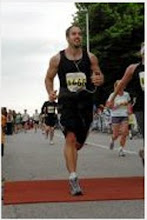The "neural efficiency hypothesis" (NEH) posits that experts solve problems or conquer tasks and use less neural (brain) activity to accomplish it; hence, their brains approach the problem more efficiently! This idea has been taken to the experimental test in extreme, or expert, athletes. A research group in Italy, Dr. Claudio Del Percio and his colleagues, recently (3) compared brain activity and behavioral responses between non-athletes, expert fencers, and expert karate masters. The research participants sat in a lab and viewed images of fencing and/or karate attacks and had to make a determination if the attack was an attack from/to the right or the left by pressing a key as quickly as they could. While this was happening the researchers were measuring continuous brain electric activity using EEG (4).
Dr. Del Percio and his colleagues discovered that the expert athletes were no better and no faster at responding to the attack movements when compared to non-athletes, although there were trends for the non-athletes and karate athletes to make more corrects responses for right and left athletes, and for the karate athletes to respond a little fast than the other two groups. The brain activity analysis revealed (I summarize here) that non-athletes showed increased activity to right attacks, relative to both athlete groups, but there was no difference in activity between groups for the let attack condition. Interestingly, this confirms the NEH for the right attack by showing that expert athletes show reduced neural activity when responding to images that represent their sport when compared to non-athletes. The study also highlights issues with the NEH: namely that for left attack the NEH was not supported. Additionally, for some conditions the researchers found that the karate athletes actually showed increased neural activity, which confirms my suggestion that martial arts is just simply damn good for you!
At the end of the day, what does it all mean? In my interpretation, I think this means that the NEH is not perfect and needs more research. Essentially, the way in which neural efficiency "is activated in the brain" may depend on the side of the event (I should have noted that all the participants were right handed), the hemisphere of the brain that processes the information, and the type of athletic training/expertise involved.
Why do I care about the "neural efficiency hypothesis"? For two reasons: 1) because as an active researcher myself, with a healthy interest in fitness and the brain. 2) because as I make may way forward in training to execute various gymnastics style moves, I realize that like many other behaviors (e.g., music, dance, etc) that are both physical and coordination based thinking about things messes you up. It takes you out of the "zone". The gymnastics style exercise(s)/routines I am trying to learn also fall into this "zone" psychology realm, I think. For example, when I first started to train for the L-seat I had to put a lot of thought into what my hands had to do, what my hip flexors has to do, my core strength, etc. Now that I have been doing the mover for a few months, I can just, sort of, pop up into the move. In fact, now when I think too much about it, especially during the exercise, the move get ugly. Thinking about it prior to executing it seems to help - as a mental preparation or practice almost. Interestingly, because the nature of 'being in the zone' maybe that it taps into neural efficiency, it should free up the brain to do other things. For example a recent post at wst-training talked about evaluating getting into a move and the do's and don'ts. Because the move had become familiar, Dan is able to evaluate other aspects of the move and provide advice and instruction to the rest of us. This effect appears to be related to a number of psychological constructs such as intelligence (5) and memory (6). Future investigations in my lab may take the form of investigating neural efficiency toward faces. In fact, I guess we have already shown in several studies that same-race faces are processed quite differently than other race faces (7, 8). We will also being to actively research this in the athletic/fitness realm as well.
So, I guess if there is going to be a moral to this story, it's try to work toward neural efficiency if only so that you can provide me with advice (like Dan has) to be a better athlete!






No comments:
Post a Comment